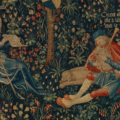In Paraguay, Guaraní culture thrives. Known for their connection to nature and rich oral traditions, the Guaraní have long spoken of a mythical realm dear to their hearts –the Land Without Evil, La Tierra Sin Mal.
This utopian paradise, often described as a place of eternal abundance and harmony, is an ancient source of hope and resilience for the Guaraní people –and, in more ways than one, for all Paraguayans. It represents a world free of suffering, where nature flourishes and all living beings coexist in perfect balance –a Guaraní version of Saint Brendan’s Island of Paradise, if you will.
Guaraní mythology makes it clear that the Land Without Evil is not just a distant fantasy or a legendary pilgrimage destination. First and foremost, it is an active pursuit –an ongoing quest that shapes the daily lives and aspirations of the Guaraní people. Their journey toward this realm is not some escapist fantasy, but a continuous striving to create a world that reflects the principles of harmony and mutual respect.
The legend claims that the Land Without Evil is a place where corn grows abundantly without the need for cultivation, where rivers flow with clear, refreshing water, and where animals and plants coexist in perfect harmony. In, short, it is a world where hardship is simply nonexistent. Peace and tranquility reign instead.
Now, the important thing is that the concept of a land without evil is not only a spiritual aspiration for the Guaraní people. It is more of a guiding principle. The Land Without Evil is something to be built, not to be “discovered” at the end of an epic trip. In that sense, it is a daily, ordinary pilgrimage towards one’s own home –or, even better, towards the earth we want to live in. That is the reason why their agricultural practices, for example, are deeply rooted in sustainability and respect for the environment, as they understand that the land is a gift entrusted to them. It also explains why the Jesuit missions in Paraguay were so successful: they were, to a great extent, guided by the very same aspiration: that of building a community that is free of all kinds of evil.
The Guaraní carefully manage their small plots of land, ensuring that they are not overexploited. They use traditional methods that harmonize with the natural cycles of growth and regeneration, so that the land remains fertile and productive for centuries to come – in the hope that future generations would be able to enjoy the fruits of the land without tolling it, maybe.
This deep respect for nature extends beyond agriculture to the Guaraní’s entire worldview. They perceive all living beings, from plants and animals to rivers and mountains, as possessing a shared spiritual core. This connection to the natural world is highlighted in their ceremonies, which often revolve around celebrating and thanking nature’s bounty. The Guaraní’s belief in a land without evil is thus not a passive resignation to the imperfections of the world, a fuga mundi of sorts; it is a driving force that motivates them to strive for a better future.
In a world increasingly marked by conflict, environmental degradation, and social injustice, the Guaraní myth of the Land Without Evil offers true inspiration. The Land Without Evil is not just a mythical realm; it is a tangible possibility, a testament to the power of human dreams and the enduring spirit of hope –if there is anything we can learn from the Jesuitic Missions in Paraguay, is that building an evil-less community is indeed within our reach.





